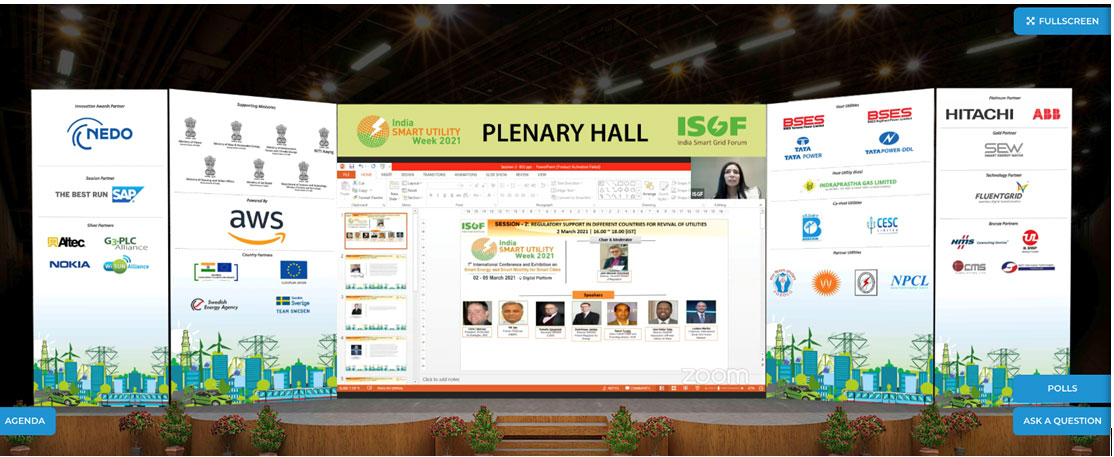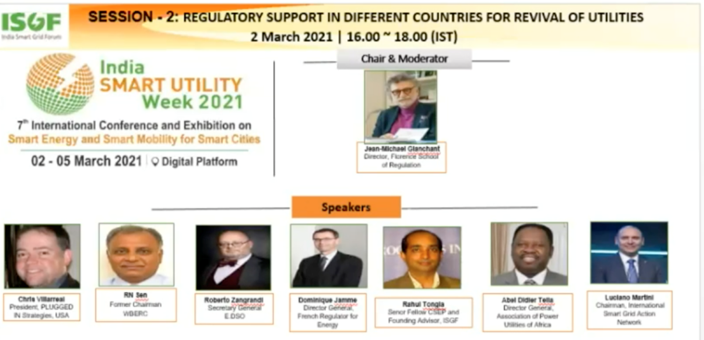The Thematic Session-2 was on regulatory support in different countries for the revival of utilities. The session was moderated by Jean-Michael Glanchant, director, Florence School of Regulation. It included presentations by Dominique Jamme, director general, French Regulator for Energy; Luciano Martini, chairman, International Smart Grid Action Network; Roberto Zangrandi, secretary general, E.DSO; R.N. Sen, former chairman, West Bengal Electricity Regulatory Commission; and Abel Didier Tella, director general, Association of Power Utilities of Africa. The session also included remarks by Rahul Tongia, senior fellow, CSEP; and Christopher Villarreal, president, PLUGGED IN Strategies, USA.
Glanchant began by highlighting the shocks that the electricity sector has suffered due to Covid-19 and climate change. He stressed on the decline in electricity consumption witnessed across the commercial and industrial segment worldwide, and commended the regulatory support provided in different countries that have balanced consumer needs while maintaining the financial viability of utilities. He also highlighted the need for greater investments to improve the quality of service, and the adoption of technology and business models to reduce costs.
Jamme highlighted the issue of lower electricity demand witnessed in the French market in the months of March to May and November 2020, and the consequential low wholesale energy prices (falling from Euro 40 per MWh to Euro 15 per MWh), which resulted in financial losses for utilities. Emergency measures taken by the government allowed certain customers to defer or stagger payments of their energy bills, which further impacted suppliers. However, regulated network operators have a full guarantee on their allowed revenue; hence, the loss of revenue due to lower energy consumption in 2020 will be recovered in 2021 via a tariff increase. The delays encountered in network deployment and smart meter roll-out are also expected to be mitigated during 2021-22.
Martini highlighted some of the key measures adopted by the Italian Regulatory Authority, ARERA. He mentioned that in March 2020, ARERA postponed the deadlines for the collection of electricity and gas information from all operators, besides postponing all inspection and sanction procedures carried out by ARERA. In April-June 2020, ARERA introduced a temporary reduction in fixed parts of its network tariffs and in general system charges set to support SMEs. A special fund of Euro 1.5 billion has been established with the aim of rapidly providing financial resources for regulatory interventions in favour of end-customers or supply operators. ARERA has also defined the provisions for compensation to system operators for the lower revenues resulting from the law-based tariff discounts given to consumers. Special measures were also taken to prevent payment of compensation or penalties to DSOs for quality of service issues related to Covid-19.

Zangrandi discussed the regulatory actions needed at the EU and national levels to enable energy transition. The main challenges include the planning and execution of investments, improving security of supply and automation, and enabling energy transition. He highlighted the need to facilitate an EU general framework for cybersecurity and data management, as well as to speed up clean energy package implementation at the national level, besides enabling a forward-looking remuneration framework. In addition, he pointed out that there is a need to develop roles, smart infrastructure, economic signals, and information exchange procedures under EU interoperability principles, besides cost-reflective tariffs.
Sen talked about the short-term and long-term support from regulators. Short-term support can include allowing licensees to utilise available contingency funds with three-year moratoriums and refunds in monthly installments, allowing interest pass-through of PFC/REC loans to licensees, and similar considerations to be allowed in the case of private licensees for loans taken on similar lines. In the long term, he said there is a need to introduce different tariffs for different voltage levels and to ensure a common tariff for all categories of consumers at the same voltage level. By offering competitive tariffs, discoms should see demand increase. Further, there should be a focus on IT-enabled support such as ERP solutions and prepaid smart meters, reduction in AT&C losses, and implementation of smart grid technologies.
Tongia discussed the temporary and permanent impact of Covid-19 on electricity utilities. He stated that the problem is one of liquidity rather than solvency, as bills, if unpaid today, may come in later. He highlighted the need to look at the high fixed cost part, and to intervene and invest in the green space. Major structural changes are required in the already strained sector, the flaws of which have been exposed by the Covid-19 pandemic. There is alsoa need to adopt social equilibrium in the pricing of electricity.
Villarreal talked about the recent blackout in Texas, which was mainly driven by unanticipated weather changes, which could have led to a complete failure of the Texas grid. The spot rates rose to $9,000 per MWh. He noted the lack of planning and the need to better weatherise the system. Further, he highlighted the role of new technologies such as mini-grids and energy storage systems.
Tella discussed the impact of Covid-19 on power utilities in the African countries. He highlighted the issues of a drop in electricity demand, the change in electricity consumption patterns and the loss of revenue. Faced with the impact of Covid-19, a meeting was convened in March 2020 to discuss the issues faced by the energy sector in Africa and the urgent Covid-19 measures needed. A recovery plan was formulated in May 2020. Under this plan, among other things, continuity of electricity was ensured for low-income populations through measures such as not disconnecting them for non-payments, suspending payments, or providing electricity free of charge. Further, ways were explored to reduce the fuel cost of electricity generation, in line with the drop in international fuel prices.
Supporting Ministries 2021

KEY PARTNERS 2021
Powered by: 
Host Utilities: 
Co-Host Utilities: 
Partner Utilities: 
Platinum Partner: ![]()
ISGF Innovation Awards Partner: 
Gold Partner: 
Session Partner: 
Technology Partner: 
Silver Partners: 
Country Partners: 
Bronze Partners: 
ISUW 2021 EXHIBITORS

